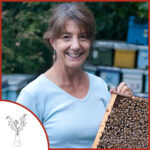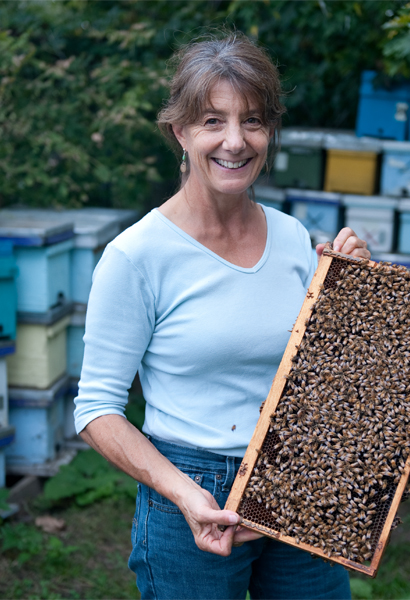

Birth: 1955
Specialty: Entomology
Major Contributions:
MacArthur Fellowship grant for work with honeybees
Founded the Bee Squad
Bred a disease-resistant strains of bees called “Minnesota Hygienic”
Image Courtesy of the University of Minnesota
Inspired by a book she picked up from the library, Dr. Marla Spivak wanted to learn about the complex social structures of bee colonies when she was 18. So she spent the next summer working on a commercial bee farm and has been studying these creatures ever since.
With a bachelor’s in biology and doctorate in entomology, Spivak is a professor at the University of Minnesota. There, she teaches courses and leads the Spivak Honeybee Lab, where a team of scientists study the behavior of colonies.
One of the groups focuses on looking at what she dubs social healthcare–how bees keep themselves healthy–mainly through two processes. The first is a mechanism for hive hygiene where some bees are able to find and eliminate sick individuals from the nest in order to keep the colony healthy. The second is the use of resins collected from plants by the bees to form propolis inside the nest. This propolis works as a natural antibiotic and disinfectant that bolsters the colony health and social immunity.
In the past few years scientists have been shocked and dismayed that bee colonies were dying in large numbers in what has been named colony collapse disorder. Spivak and other entomologists have determined that the bees are dying from multiple, interacting causes of death–a four-part convergence of factors that is leading to the large numbers of colonies dying off. The four factors are farms that exist as monocultures, pesticides, flowerless landscapes, and a variety of bee diseases and parasites.
Spivak’s advice for those concerned with the drop in bee populations is twofold–first plant flowers! Select flowering plants that are native to your area and secondly don’t use harmful pesticides on those plants.
As bees depend on flowers to meet their nutritional needs, more than one third of the world’s crop production depends on bees for pollination and therefore we depend on bees for our food. The small act of planting flowers can be a driver of change that could end up saving bees everywhere.
Written by Angela Goad
Sources:
University of Minnesota: Marla Spivak
MacArthur Foundation: Marla Spivak
TED: Marla Spivak-Why bees are disappearing
See Also:
University of Minnesota: Meet the Spivak Honey Bee Lab
University of Minnesota Bee Lab: Bee Squad
Busy with bees: Faribault prison inmates abuzz with new program
